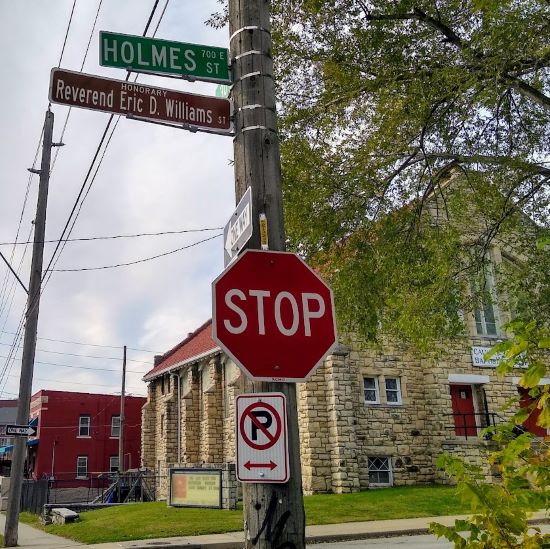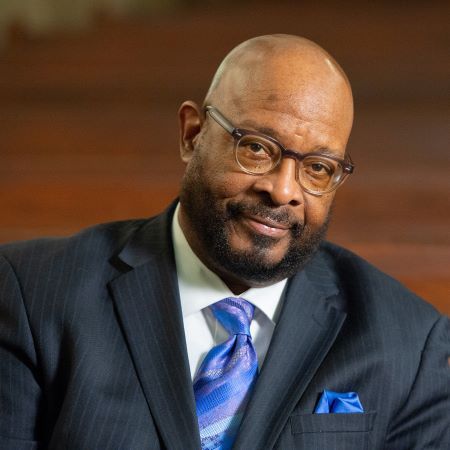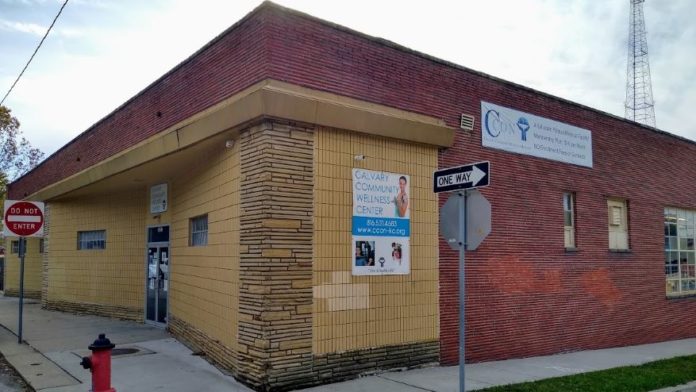Published November 28th, 2021 at 6:00 AM
Above image credit: Calvary Temple Baptist Church at 30th and Holmes streets, where the Rev. Eric D. Williams has been pastor for several decades. (Bill Tammeus | Flatland)
I first met the Rev. Eric D. Williams at least 30 years ago. “When I had hair,” he joked in a recent conversation.
At the time, the AIDS epidemic was crushing Kansas City and I was active in an AIDS ministry at my church. For his part, Williams about that time got a call from a funeral director asking him to do a service for a young Black man whose pastor refused to do that funeral because the man had died of that horrid disease.
Williams knew then what he still knows today: “If we sit back and do nothing, then we’re complicit. It’s the burden that we have that catapults us into service. Maybe it’s a Jeremiah spirit just weeping for folks and the (unhealthy) conditions they’re in that makes us move.”
Williams, long-time pastor of Calvary Temple Baptist Church, led the creation of the Calvary Community Outreach Network (CCON) to continue that health-focused work. In turn, that organization has been a spark behind an anti-COVID effort called Our Healthy Kansas City Eastside (OHKCE). It’s made up of congregations, community organizations, businesses and representatives from the University of Missouri-Kansas City’s health sciences divisions.

OHKCE, Williams says, is “a beautiful system in which we can collectively work on health disparities long after COVID is gone, if that time ever comes.”
In recognition of that system and the part UMKC has played in it, CCON earlier this month at its annual fundraising event presented a humanitarian award to the school’s chancellor, C. Mauli Agrawal.
In all of this, Williams sees his role as responding to a call to servant ministry.
“The reality that there are glaring differences in health status (of people of color) is disheartening,” he says, “and on some days it just makes me angry. The anger has to fuel programs, services, support and solutions. That’s what CCON is about.”
Over the years, Williams has learned how to pivot quickly to meet needs that he hadn’t imagined. And his congregation has come to expect the unexpected from him.
“Members of Calvary Baptist Church,” he says, “have been doing things like this for so long that it’s almost expected. It’s not a struggle at all.”

When AIDS ministry was required, that’s what the pastor and members did — and still do. At the time, in the early 1990s, there was a lot of denial about AIDS in the Black community, especially because it was so associated with gay men, who often didn’t feel welcome in Black churches. Williams and Calvary were AIDS ministry pioneers among people of color in Kansas City.
When that ministry expanded to broader health concerns, Williams and his church opened a health and fitness center where people could exercise and fight common diseases among people of color such as diabetes and heart disease.
And when the COVID-19 pandemic arrived, Williams and the church responded quickly. First, of course, CCON shut down the wellness center to keep participants from giving the virus to one another. But then they began to use the space to collect and distribute food to people in need.
Williams hopes to be able to reopen the wellness center soon after the first of the new year.
“The evolution,” he says, “has been significant and rewarding and beneficial.”
So much so that other congregations began to do some of the same things Calvary Temple Baptist was doing. And at first, Williams wasn’t quite sure how to take that.
“Initially,” he admits, “I was offended that people would copy things that we’ve done. But imitation is the kindest form of flattery. And I know that if what we do is replicated around the city, it means more people are helped.”

Williams calls life-threatening issues faced by the people he serves “burdens. We did HIV because of a burden. We did gangs because of a burden. We do a workout center because of a burden. It just hurts to watch people die unnecessarily.
“Part of our charge and our hope is that we help build capacity for churches that have dreams and goals to do exactly what we’ve done or something reasonably like it.”
A similar burden drove Covenant Presbyterian Church at 5931 Swope Parkway to create its own health and wellness center a few years ago. It’s no coincidence that Williams is a close friend of the pastor there, the Rev. Kirk Perucca, who, unlike Williams, is retiring at the end of December.
The range of CCON and Williams, its executive director, goes beyond health issues nowadays. For instance, it has created the Helping Youth Plan for Excellence (HYPE) program to give young people skills in the performing arts through the HYPE Media Lab.
At its core, CCON, like Calvary Temple Baptist, is rooted in theology. Williams puts it this way: “God has placed us here for such a time as this. Sometimes it’s risky and other times costly, but we have to be courageous and insightful and not afraid to do what’s necessary to help our folks.”
That’s been the case for decades — starting when Williams had hair and when my own hair was brown.
Bill Tammeus, an award-winning columnist formerly with The Kansas City Star, writes the “Faith Matters” blog for The Star’s website and columns for The Presbyterian Outlook and formerly for The National Catholic Reporter. His latest book is Love, Loss and Endurance: A 9/11 Story of Resilience and Hope in an Age of Anxiety. Email him at wtammeus@gmail.com.
Related Stories








